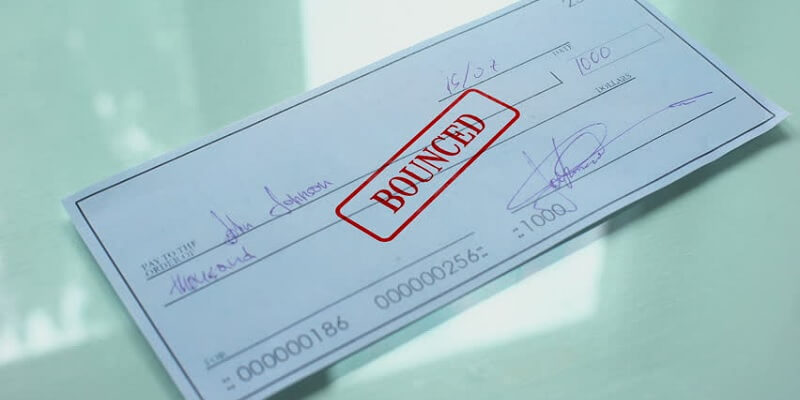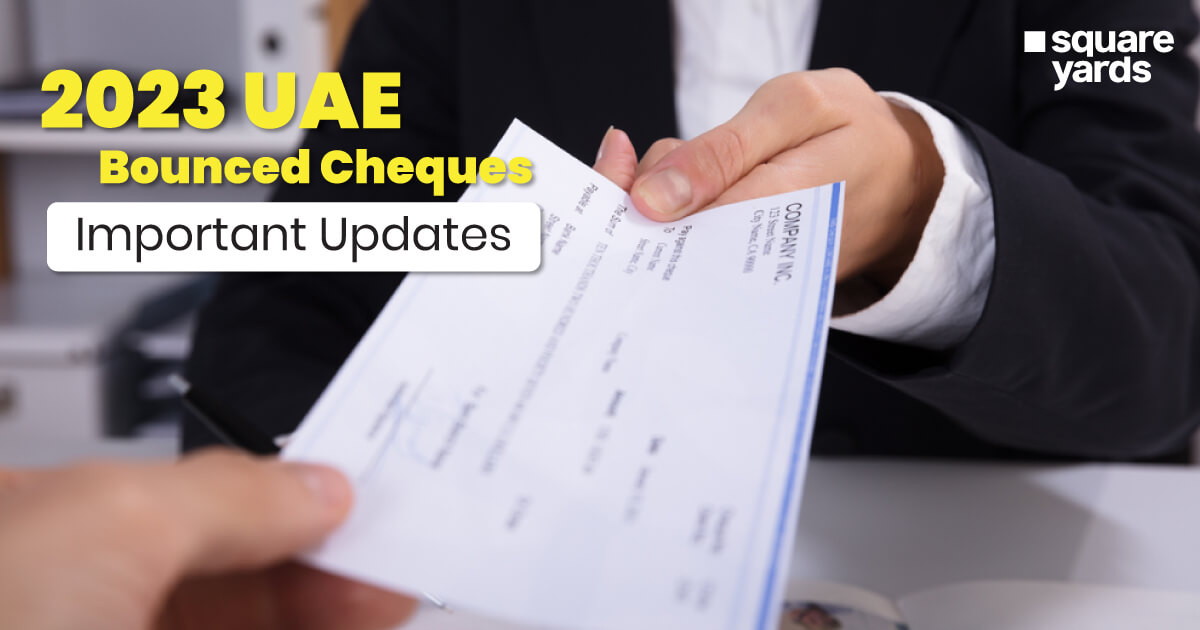Understanding the Causes of a Bounced Cheque in UAE
A cheque case in UAE typically happens due to:
- Insufficient Funds: If the account lacks enough balance to cover the cheque amount. (if the cheque bounces due to insufficient balance in UAE)
- Technical Errors: Issues like incorrect dates, mismatched signatures, or scribbled text.
- Account Closure: When the account is closed before cashing the cheque.
- Payment Hold: If the account holder instructs the bank to stop payment.
Cheque Form and Essential Details in the UAE
Under the UAE Commercial Transactions Law, all cheques issued for payment must meet specific requirements to be valid. Banks provide secure chequebooks containing blank cheques that include the following printed details:
- Name of the account owner
- Account number
- Unique serial number of the cheque
What are the Key Requirements for a Valid UAE Cheque
A valid UAE cheque must include the following particulars:
- The term “cheque” is written in the language of the text.
- An unconditional order to pay a specific amount.
- The name of the drawee bank (responsible for payment).
- The payee’s name (person or entity to receive the payment).
- The designated place of payment.
- Date and place of cheque issuance.
- The signature of the drawer (the cheque issuer).
Important Note:
- The bank considers a cheque issued on the day you present it for payment if it lacks a date.
- The bank designates its head office as the payment location if no place of payment is mentioned.
- If the place of issuance is missing, the bank assumes the signing location as the issuance point.
Ensuring Funds for a Cheque in UAE
The law does not permit issuing a cheque without sufficient funds in the account. The drawer must ensure enough balance to cover the cheque amount at the time of issuance. If there are insufficient funds, cheque bounce charges in the UAE may apply, leading to a cheque bounce case in the UAE.
In cases where funds are inadequate:
- The payee has the right to request a statement from the drawee bank to confirm non-payment. (if the cheque bounces due to insufficient balance in UAE)
- Both parties must act honestly to avoid issues like a check bounce in UAE.
By adhering to these rules, individuals can avoid penalties and legal consequences under the bounced cheque UAE new law while ensuring smooth financial transactions.
Legal Changes: Bounced Cheque UAE New Law

The bounced cheque UAE new law introduced amendments to balance justice and efficiency:
-
Decriminalization:
One significant change in jail terms for cheque bounce in the UAE is that the time is reduced. Authorities can pursue a criminal case if any of the following situations occur:
-
- The drawer instructs the bank not to cash the cheque before the specified day.
- The drawer closes the account/ withdraws the available balance before the due date.
- The cheque is intentionally signed inaccurately.
- The drawer deliberately writes/ signs the cheque incorrectly.
-
Partial Payments:
The banks must now pay the available amount for insufficient funds.
-
Exceptions:
Fraudulent actions, such as forgery, still carry criminal liability, including a jail term for cheque bounces in the UAE.
Cheque Liability and Time Limits in the UAE
A cheque is a payment tool that relies on sufficient funds in the account. If the cheque remains unpaid, the payee has the right to take action against the drawer, endorsers, or any other liable parties. Moreover, a bank statement from the drawee (the bank) confirms the failure to pay.
-
Time Frame for Presenting a Cheque
- They must present a UAE cheque for payment within 6 months of its issue date.
- Do not cash the cheque before its issue date.
- The drawer must ensure funds remain available until the cheque is presented. If not, the payee can also take legal action without presenting the cheque or filing a protest.
-
Limitation Period for Action
- Parties cannot initiate legal action more than 2 years after the cheque’s expiry date.
- If someone files a lawsuit, the 2-year limit resets from the date of the last legal action.
- This rule does not apply if the debt is renewed through adjudication or acknowledged in a separate deed.
Legal Proceedings for Cheque Bounce in UAE

A cheque bounce in the UAE occurs when the bank confirms non-payment through an official statement, which must be provided within 3 working days. If the issue is unresolved, legal proceedings can begin as criminal or civil cases for a bounced cheque in the UAE.
-
Filing a Police Complaint
To address a bounced cheque case in UAE, the cheque holder must:
- File a formal complaint at the local police station or the Dubai Police mobile application.
- The drawer can also resolve the issue immediately by paying the cheque amount.
- If the drawer requests time to settle, they may need to deposit their passport as security.
Note: If unresolved, an automatic travel ban or arrest warrant is issued.
-
Role of Public Prosecution
If the dispute remains unsettled, the case moves to public prosecution:
-
- The court may request bail, which can be paid as cheque bounce charges in UAE or by providing a guarantor’s passport.
- The drawer may be detained if bail is denied until a final decision is made.
-
Criminal Case Proceedings
Under the bounced cheque UAE new law, criminal liability applies only in cases of:
- Fraud, forgery, or deliberate errors.
- The drawer closes the account or withholds funds intentionally.
The Criminal Court examines the evidence and determines penalties:
- Cheque bounces fine in UAE: AED 1,000 to AED 30,000, depending on the cheque amount.
- Jail Term for cheque bounce in UAE: For proven bad faith, imprisonment of 1 to 3 years may apply.
-
Civil Case for Bounced Cheque in UAE
If criminal proceedings are unnecessary, the cheque holder can file a civil case for cheque bounce in UAE. Thus, civil courts allow claimants to:
- Recover the unpaid cheque amount.
- Attach the drawer’s assets if payments are not made.
Failure to comply may result in further penalties or jail time. The drawer can leave the country once the legal process concludes and there are no unresolved issues.
What Are the Penalties for Bounced Cheques in UAE?

According to UAE law, cheque bounce charges in UAE depend on the cheque amount:
|
Cheque Amount |
Fine Amount |
|
Less Than AED 50,000 |
2,000 |
|
AED 50,000 – 100,000 |
5,000 |
|
AED 100,000 – 200,000 |
10,000 |
-
Jail Term for Cheque Bounce in UAE: Key Details
Under UAE law, forging bounces in UAE or altering cheque details, such as allocating a cheque to a third party, can result in severe penalties. Individuals found guilty may face a one-year jail term for cheque bounce in UAE and fines ranging from AED 20,000 to AED 100,000. Moreover, these measures ensure transparency and accountability, reducing cheque bounce cases in the UAE.
Summing Up
Bounced cheques in the UAE can arise due to insufficient funds, errors, or account issues. The cheque bounce charges in UAE and legal proceedings also ensure accountability while minimising unnecessary jail terms. Moreover, if you encounter a cheque bounce case in UAE, stay informed about the bounced cheque UAE new law and seek legal assistance.
Recommended for you :
|
Guide To New Bounced Cheque Law in UAE |
|
|
All About Tenancy Contract Sharjah |
|
|
Know About UAE Unemployment Insurance Scheme |
|
|
Understand Labour Law in UAE |
Frequently Asked Questions (FAQs)
A criminal case can be filed against the person, and they may face a travel ban or an arrest.
The drawer should try to settle the case with the payee by paying the amount through cash or other methods.
A bounced cheque due to insufficient funds is no longer a criminal offence, except for those issued in bad faith.
The punishment for a cheque bounce in the UAE could be a fine, a jail term or both.
To file a case of a bounced cheque in Dubai, you can complain either at the police station or through the Dubai Police mobile application.
You should check the official government website or visit your nearest police station to lodge your complaint.
If a cheque issued in good faith is dishonoured, you can still be asked to pay a fine or submit an act of innocence, such as if funds are unavailable.
No, it is just a penalty; you must still pay the said amount on the cheque.
You have the option to either settle the matter with the payee or utilise the insolvency law.
If the payee refuses to end legal proceedings, you should submit the necessary documents and report the matter to the police. What happens when a cheque bounces in the UAE?
What should the drawer do?
What is the new rule for bounced cheques in the UAE?
What is the punishment for cheque bounce in the UAE? What are the rules for bounced cheques?
How to file a case of a bounced cheque in Dubai?
How to file a case of bounced cheque in the UAE’s other Emirates?
What happens if a cheque issued in good faith is dishonoured?
Does the bounced cheque issue end if I pay the fine amount?
What if I don’t have the money to pay the amount?
What if I paid the amount, but the payee refused to end legal proceedings against me?




